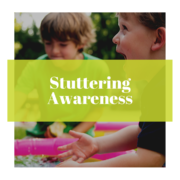Stuttering Awareness
Just before Halloween each year, speech pathologists and educators recognize International Stuttering Awareness Day as a way to bring attention to a widely misunderstood condition. While families dealing with a stuttering condition often feel alone in their frustration, it is important to highlight the many strategies and resources available to ease the stress of this temporary, or sometimes lifelong, journey.
Fact vs. Fiction
- The onset of stuttering symptoms typically occurs in the early toddler years, around 2-4 years old; however, there is no single known cause of stuttering.
- Boys are more likely to develop a stutter than girls. And while many children (about 5%) develop a stutter for a short period of time, a small percentage of those children will experience lifelong stuttering issues.
- Children whose stuttering persists for 3 or more years will likely deal with the condition throughout their whole lives.
There are no psychological or intellectual factors related to stuttering. Many people believe that stuttering is a result of high anxiety; however, this is untrue. Stuttering may contribute to anxiety because of the social implications, but it is not caused by anxiety. - Similarly, a child who stutters is often viewed as excessively nervous or insecure, but this is also untrue. What is true is that high stress environments or stressful circumstances may cause a child to stutter more noticeably, much like how symptoms of Tourette’s can be triggered or exacerbated by stress.
- Frequency and severity are not consistent; a child’s stutter could improve or worsen as days, weeks, or months go on.
Speech therapy will not cure a child’s stutter. However, therapy can provide children with strategies for managing and/or easing the stress associated with stuttering. - Stuttering is not indicative of a learning disability, but may contribute to poor performance in school because of a child’s unwillingness to participate, engage, and ask questions. In some instances, a child will answer with “I don’t know” even when they do know the answer, but are insecure about the possibility of stuttering while speaking out loud.
- Insecurities surrounding one’s stutter might cause social withdrawal and/or an inability to participate in group activities. Stutterers may also feel limited by their speech difficulties and therefore might not take academic or vocational risks that others would.
- When children are struggling to produce a sound, their stutter may result in what experts call “secondary behaviors.” These include tight blinking, jaw clenching, pursing lips, unintentional spitting, etc. In essence, the child is battling to spurt out the word or syllable.
- Stuttering might be limited to word/syllable repetitions or prolongations, but some children experience both patterns. Repetition occurs when the sound or syllable is repeated in isolation, whereas prolongations are long, continuous, drawn out forms of a beginning syllable. “I-I-I want that!” vs. “Sssssss-top that!”
- Telling a child to “slow down” or “think about your words before speaking” is not helpful advice. In actuality, those pointers often make children feel more self-conscious in that moment and could aggravate their condition, increasing their likelihood of stuttering.




